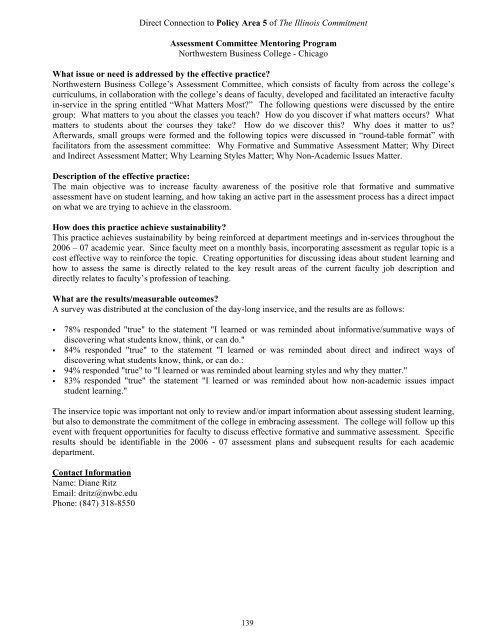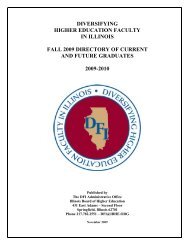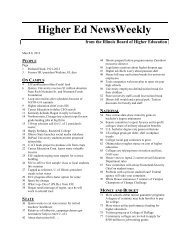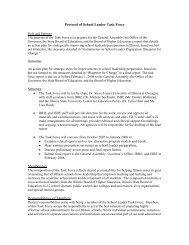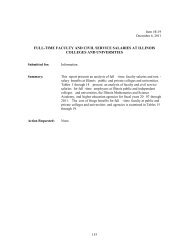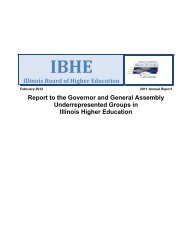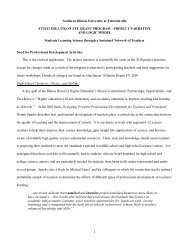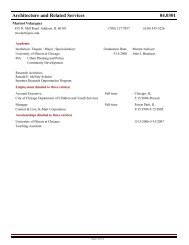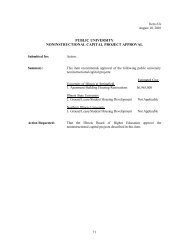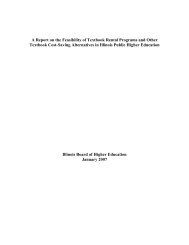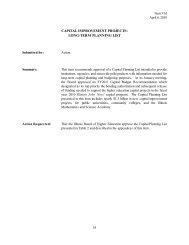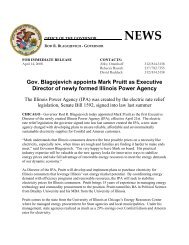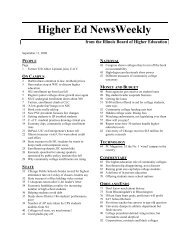Title of Effective Practice: - California Postsecondary Education ...
Title of Effective Practice: - California Postsecondary Education ...
Title of Effective Practice: - California Postsecondary Education ...
Create successful ePaper yourself
Turn your PDF publications into a flip-book with our unique Google optimized e-Paper software.
Direct Connection to Policy Area 5 <strong>of</strong> The Illinois Commitment<br />
Assessment Committee Mentoring Program<br />
Northwestern Business College - Chicago<br />
What issue or need is addressed by the effective practice?<br />
Northwestern Business College’s Assessment Committee, which consists <strong>of</strong> faculty from across the college’s<br />
curriculums, in collaboration with the college’s deans <strong>of</strong> faculty, developed and facilitated an interactive faculty<br />
in-service in the spring entitled “What Matters Most?” The following questions were discussed by the entire<br />
group: What matters to you about the classes you teach? How do you discover if what matters occurs? What<br />
matters to students about the courses they take? How do we discover this? Why does it matter to us?<br />
Afterwards, small groups were formed and the following topics were discussed in “round-table format” with<br />
facilitators from the assessment committee: Why Formative and Summative Assessment Matter; Why Direct<br />
and Indirect Assessment Matter; Why Learning Styles Matter; Why Non-Academic Issues Matter.<br />
Description <strong>of</strong> the effective practice:<br />
The main objective was to increase faculty awareness <strong>of</strong> the positive role that formative and summative<br />
assessment have on student learning, and how taking an active part in the assessment process has a direct impact<br />
on what we are trying to achieve in the classroom.<br />
How does this practice achieve sustainability?<br />
This practice achieves sustainability by being reinforced at department meetings and in-services throughout the<br />
2006 – 07 academic year. Since faculty meet on a monthly basis, incorporating assessment as regular topic is a<br />
cost effective way to reinforce the topic. Creating opportunities for discussing ideas about student learning and<br />
how to assess the same is directly related to the key result areas <strong>of</strong> the current faculty job description and<br />
directly relates to faculty’s pr<strong>of</strong>ession <strong>of</strong> teaching.<br />
What are the results/measurable outcomes?<br />
A survey was distributed at the conclusion <strong>of</strong> the day-long inservice, and the results are as follows:<br />
• 78% responded "true" to the statement "I learned or was reminded about informative/summative ways <strong>of</strong><br />
discovering what students know, think, or can do."<br />
• 84% responded "true" to the statement "I learned or was reminded about direct and indirect ways <strong>of</strong><br />
discovering what students know, think, or can do.:<br />
• 94% responded "true" to "I learned or was reminded about learning styles and why they matter."<br />
• 83% responded "true" the statement "I learned or was reminded about how non-academic issues impact<br />
student learning."<br />
The inservice topic was important not only to review and/or impart information about assessing student learning,<br />
but also to demonstrate the commitment <strong>of</strong> the college in embracing assessment. The college will follow up this<br />
event with frequent opportunities for faculty to discuss effective formative and summative assessment. Specific<br />
results should be identifiable in the 2006 - 07 assessment plans and subsequent results for each academic<br />
department.<br />
Contact Information<br />
Name: Diane Ritz<br />
Email: dritz@nwbc.edu<br />
Phone: (847) 318-8550<br />
139


